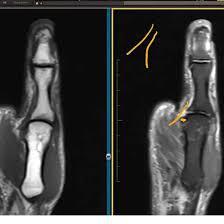Book an Appointment
MRI Right Thumb
MRI is a noninvasive imaging technique that produces detailed pictures of bones, tendons, ligaments, cartilage, and other soft tissues. A magnetic resonance imaging scan uses powerful magnetic fields in concert with radio waves to generate images that help physicians diagnose and treat conditions with greater accuracy. The usefulness of MRI is particular for capturing those soft tissues that do not distinctly appear on X-rays or computed tomography scans. Unlike other imaging, MRI does not use radiation; hence, it is safer, especially if the area of interest is delicate, such as in the case of the thumb. MRI for the right thumb is conducted when the hand is positioned in a still position, but images are taken in planes that show any abnormalities or injuries. Medifyhome MRI for the right thumb includes specialized imaging services to provide accurate information in great detail regarding various conditions affecting the thumb. This includes the use of strong magnetic fields, along with radio waves, to help produce high-resolution images regarding bones, ligaments, tendons, and other soft tissues of any subject; it is also non-invasive and radiation-free. MRI scans of the right thumb can be especially helpful if one needs to identify and check for ligament tears, fractures, and abnormalities in the joints, as well as other conditions such as arthritis or other forms of tendon or soft tissue injuries that can help one find the cause of pain or loss of mobility in the thumb. You can easily book an appointment for an MRI of the Right Thumb on Medifyhome official site or by reaching us at +919100907036, or +919100907622.
Common conditions requiring a thumb MRI
A thumb MRI is often indicated for the diagnosis of conditions that cause pain, stiffness, or impaired mobility. Common issues include ligamentous injury, including UCL tears, fractures, and tendonitis most common in athletes or those arising from repetitive strain injuries. Arthritis and degenerative joint diseases could also be diagnosed, which would further help in analyzing damage and inflammation of the joint. Moreover, an MRI of the thumb helps outline soft tissue masses, such as ganglion cysts or nerve compressions. Such an imaging option is important in conditions whereby a direct visualization may not appear on X-rays, hence allowing for a more appropriate diagnosis and effective treatment.
Why is an MRI for the Right Thumb Important?
An MRI of the right thumb is very important because it outlines a better visualization of both osseous and soft tissue structure, hence enabling better diagnosis and planning for thumb abnormalities. Unlike X-rays, which visualize only bones, MRI makes the visualization of soft tissues possible, including ligaments, tendons, cartilage, and nerves; hence, it plays a vital role in the characterization of injuries and other conditions that might have gone unnoticed.
This is especially helpful in MRI diagnoses of ligament tears, tendonitis, arthritis, and soft tissue masses. The exact imaging of the thumb enables doctors to advise on treatment and might also help avoid unnecessary surgeries, as well as speed up and make the recovery more accurate. For athletes, or for people who rely on their thumb mobility in everyday use, the right thumb MRI may be of extreme value, thus enabling timely and proper diagnosis.
Benefits of a Right Thumb MRI
Imaging a right thumb using MRI is especially important and highly valued in the diagnosis of complex conditions of the thumb due to several advantages over other imaging techniques, including the following advantages:
1.Imaging of soft tissues in great detail: MRI yields highly detailed images of soft tissues, such as ligaments, tendons, cartilage, and nerves, which are usually not well defined by X-ray and often not as distinct on CT scans. This becomes highly relevant for diagnostic purposes in conditions like ligament tears, injuries of the tendons, and abnormalities within the cartilage.
2.Non-Invasive and Radiation-Free: This imaging modality is safer compared, for example, to CT scans or X-rays, since MRI does not use radiation and is not invasive. Thus, it is much safer, especially when the repetition of imaging is necessary or the patient is sensitive to radiation exposure.
3.Multi-planar Imaging: MRI can give images in many planes such as axial, sagittal, and coronal. This helps characterize subtle abnormalities and give more about the condition.
4.Diagnostic Precision: MRI scans can easily differentiate between soft tissue damage and abnormalities in the bones. The precision of the MRI examination, therefore, helps the doctor design the treatment plan accordingly and may prevent many uncalled-for interventions.
5.Early Detection: MRI can identify early injuries or degenerating changes that do not appear on X-rays, thus allowing for early treatment that may minimize the chances of long-term complications.
Risks and Contraindications
MRI, being a type of imaging tool, is both safe and non-invasive, but there are potential risks and contraindications to consider. Typically, MRI scans are not recommended if there are implanted metals like pacemakers, cochlear implants, or aneurysm clips as the magnetic field could disrupt their operation. The major risk for severe renal impairment individuals exists only in cases when contrast dye, or gadolinium, is used; however, normally non-contrast MRI studies are not problematic. MRI scans are, in general, considered safe for pregnant clients, especially when no contrast is used. However, most doctors will tend to avoid MRI studies in pregnant women during their first trimester, except if necessary. There is also the rare of an allergic reaction to contrast agents in sensitive individuals. Claustrophobia or anxiety may also develop during the procedure, although open MRI options help alleviate this symptom somewhat. It is always necessary to let the healthcare professional know if one has a medical device, allergy, or health condition before going into the MRI.
- Test Type: MRI Right Thumb
- Preparation:
- Wear a loose-fitting cloth
- Fasting not required
- Carry Your ID Proof
- Prescription is mandatory for patients with a doctor’s sign, stamp, with DMC/HMC number; as per PC-PNDT Act
- Reports Time: With in 4-6 hours
- Test Price: Rs.4500
What does a right thumb MRI involve?
An MRI scan of the thumb shows detailed images of the bones, ligaments, tendons, and soft tissues using powerful magnetic fields and radio waves.
What is the duration of the MRI scan?
An MRI scan will last between 30 and 60 minutes, depending on the chosen protocol.
How can I get an appointment for an MRI of the right thumb with Medifyhome?
One can easily book a slot for an MRI of the right thumb on Medifyhome online portal or by contacting us at +919100907036, or +919100907622.
What is an MRI of the right thumb?
An MRI of the right thumb is an imaging diagnostic test that makes use of powerful magnetic fields, and radio waves and produces sensitive details of the thumb bones, ligaments, tendons, and soft tissues.
How long does the scanning take in the case of an MRI?
The MRI scanning will take approximately 30 to 60 minutes, depending on the protocol to be used.
Why Choose Medifyhome for MRI Right Thumb?
Medifyhome will provide a comfortable, first-class MRI of the right thumb with a focus on comfort for the patient and precise diagnosis. Conjointly working with high-value diagnostic centers, every patient booking an MRI through Medifyhome can be assured of the latest in imaging and experts operating these machines, hence very fine details for diagnosing such conditions as ligament tears, fractures, arthritis, or others. The price is competitive; booking is easily done, and there is flexibility in scheduling included in Medifyhome package. Medifyhome works to make the MRI process seamless, accessible, and dependable for any patient’s needs, by providing dedicated customer service and striving toward quality care.





